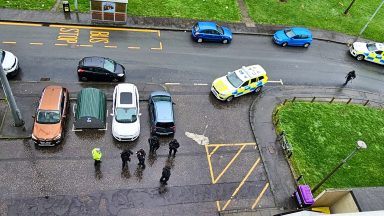Edinburgh Council has delayed a decision on its approach to banning mobile phones in schools until new Scottish Government guidance is published.
Headteachers across the city have raised concerns over “excessive mobile phone use in the classroom,” impacting pupils’ “learning development and mental health,” a council meeting heard.
Several local schools have already introduced policies banning or restricting phone use, however Conservatives in the City Chambers argued without “strong council policy” many teachers would struggle to enforce rules.
It comes after fresh UK Government guidance for schools in England said cracking down on devices being used throughout the entire day was “essential” to ensuring teachers can deliver the curriculum.
Tory councillor Christopher Cowdy said the council had “no idea” when similar guidelines being drawn up by Scottish Ministers would be made available.
He called on education officials to explore how Westminster’s policy could be implemented in Edinburgh’s schools from the beginning of the autumn term at a full council meeting held on Thursday, May 9.
But the move was voted down, as other parties agreed it was “best to wait for the Scottish Government guidance to be released” as education was a devolved matter.
A joint amendment agreed by the Labour administration, SNP, Greens and Lib Dems said the issue should go before the education committee once this was published.
It said a “top-down approach” would “not achieve the necessary buy-in from pupils and the wider school communities” and that any bans should be “led by teachers, parent councils, and the wider school community in order to build consensus”.
Youngsters urged the council to think carefully about the potential impacts of new curbs on phones.
An S3 pupil from Leith Academy speaking on behalf of Edinburgh High School Students’ Union (EHSSU) at the meeting said devices were essential for many reasons including to contact home, pay for lunch, medication reminders and neurodivergent learners who use apps that “decrease stimulation”.
He said: “The opinion that the majority of the EHSSU holds is that the mobile phone ban will be ineffective to the problem it is aiming to tackle and will create new problems and cause harm to certain groups of students.”
Councillors acknowledged a blanket ban could have a “detrimental impact on certain groups of young people…for whom access to a mobile phone is essential” in their amendment.
Research published by the Scottish Secondary Teachers’ Association (SSTA) reported 71 per cent of members were concerned “misuse of mobile phones” was “having an impact on student behaviour and learning”.
The Conservatives’ Tim Jones said the study showed teachers in Scotland had “mixed views” on banning phones in schools but the “vast majority surveyed say mobile phones disrupt classes”.
He said: “We need to try to achieve a balance.
“Only 10 per cent could point to a policy that they considered extremely effective of very effective. We need to get a policy which is used by all schools which is effective.”
Labour education convener Joan Griffiths said there were “pros and cons” regarding the use of digital devices in schools.
“It’s not a new issue,” she said. “It’s been around for quite a number of years.
“A number of our schools across the city have already implemented their own policies regarding mobile phone usage.
“While guidance is welcome it’s also vital we do not implement this without the consultation of our teachers and young people and to ensure no blanket ban is enforced which may disadvantage any young person for whom access to a mobile phone is essential.
“That’s why I think this is a great opportunity to ask our schools what implemented bans or restrictions they already have in place and also ask the young people’s forum for their views on the matter and further identify if we have any gaps in existing policies.”
Follow STV News on WhatsApp
Scan the QR code on your mobile device for all the latest news from around the country


 Getty Images
Getty Images























